What are the first things that come to mind when you hear New Orleans? For me, it is: Jazz, Mardi Gras, and Voodoo. Interestingly enough, I was at Mardi Gras over twenty years ago and the Jazz Fest over fifteen years ago, so the only real thing for me to sink my teeth in that is unique to NOLA is Voodoo. That’s why I decided to do a Vodoo Tour and it was amazing.
Recommended Read: Mardi Grass World Review
I know that there are tons of misconceptions about what Voodoo is all about no thanks to Hollywood. So it was time to learn the real info all about this mysterious religion and practice.
I was really hesitant about signing up for any Voodoo tour because with kids, especially with a preschooler, tours of any sort can be really challenging. However, after talking to Mary, owner and main tour guide of Bloody Mary Tours, we decided that the day tour which included a visit to the Cemeteries and then having a voodoo doll workshop would be the best bet for younger kids.
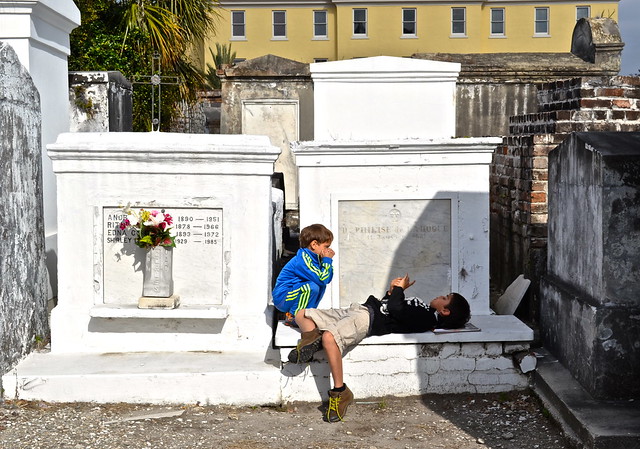
Plus, she has a van. So the kids wouldn’t have to walk too much and whine about how tired they were.
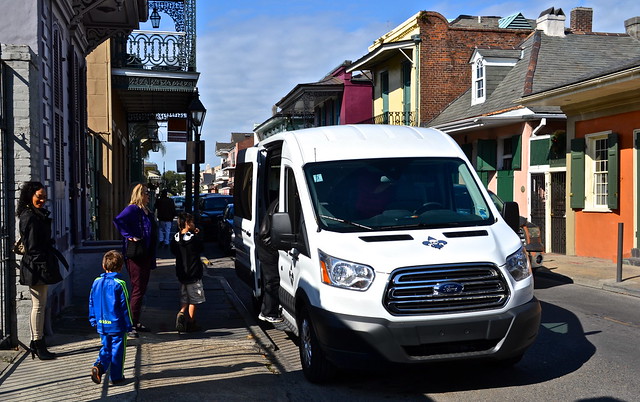
Voodoo and Cemetery Tours New Orleans Louisiana
One thing, before I dive into the tour and all that we learned. I want to say, Mary is super knowledgeable and you can tell this is her passion and life. She is the real deal. While doing the tour with her, we got to see a lot of other guides who were dressed as voodoo characters, but listening to them was almost like gibberish. It is important to find guides that you will leave with a good grasp of the history and true understanding.
Our initial meeting spot for Bloody Mary’s tour was in Lafitte’s Blacksmith Shop Bar.
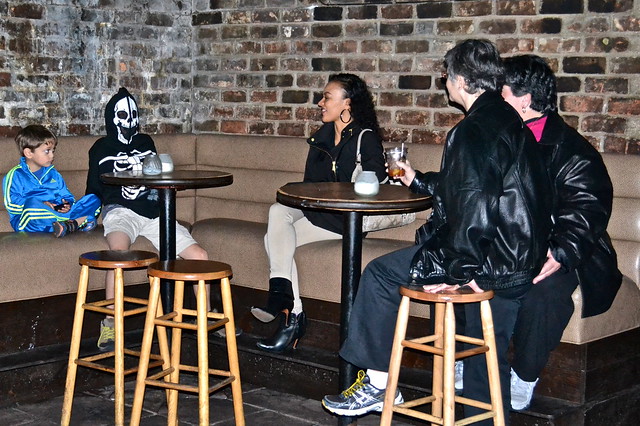
Fun Facts about Lafitte’s Blacksmith Shop Bar
- Lafitte’s Blacksmith Shop was built between 1722 and 1732 by Nicolas Touze.
- It is reputed to be the oldest structure used as a bar in the United States.
- Between 1772 and 1791, the property is believed to have been used by the Lafitte Brothers, Jean, and Pierre as a New Orleans base for their Barataria smuggling operation.
- The building escaped two great fires at the turn of the 19th Century, due to slate roofing.
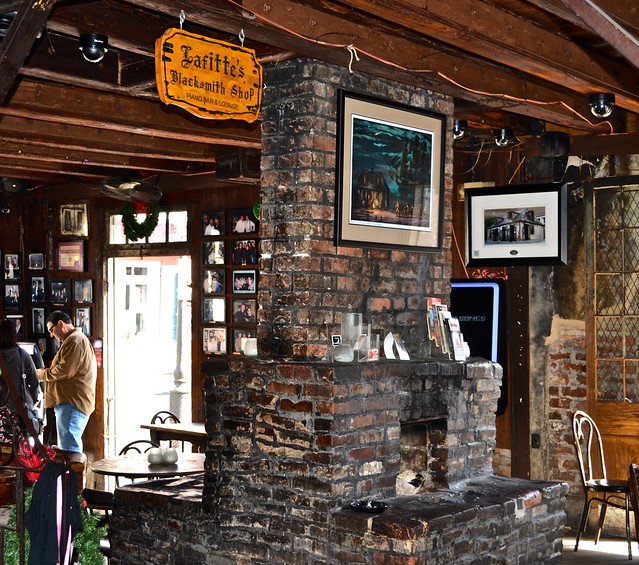
One of our next stops was Saint Louis Cemetery No. 1. I actually had no idea how important the cemeteries in these cities are and that they comprise a huge portion of the tours here.
I highly recommend visiting them with a knowledgeable guide. Otherwise, it’s simply walking around decorated tombstones.
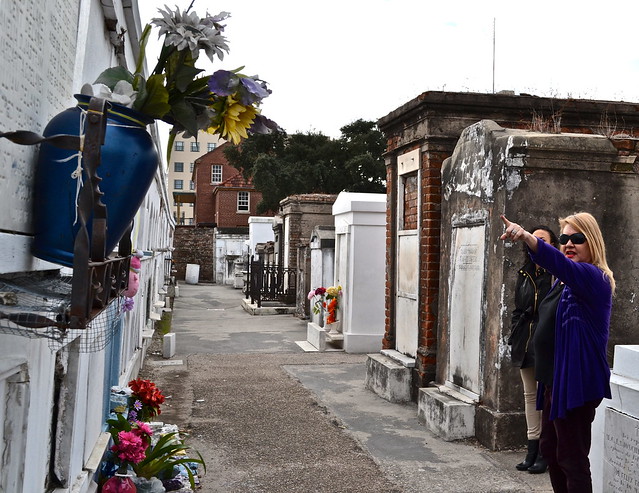
Fun Facts about Saint Louis Cemetery No. 1
- Established in the late 1700′s, St. Louis Cemetery No. 1 is the oldest cemetery in New Orleans and is still the site of several burials a year.
- Upon initial development, St. Louis Cemetery No. 1 was divided into sections for Catholics, non-Catholics, and “Negroes,” possibly referring to slaves since Gens de Couleur Libres were buried according to their religion.
- New Orleans’ location on swampy, below sea level terrain, made any high ground extremely valuable. The precious high ground would not be designated for the dead when the living could benefit from it. Therefore, the Cabildo chose a swampy site on St. Louis Street.
- By the late eighteenth century, the cemetery for the city, St. Peter Street, had begun to fill up, and the town development had reached the site’s boundaries. So on August 14, 1789, a new cemetery was created by Spanish Royal Decree. The cemetery was placed 40 yards behind the Charity Hospital, which was located on Rampart Street between Toulouse and St. Peter Streets.
- In 1796, a canal was installed next to the cemetery for the purpose of transporting goods as well as draining the swamp around the city.
- Initial burials appear to have taken place in a haphazard manner, leading to the current maze of tombs and aisles.
- Due to its location in a swamp, St. Louis Cemetery No. 1 was constantly threatened by flooding. To combat the rising waters, sand and shells were continuously added to the site, particularly along the pathways.
- In 1816, the waters of Macarty Crevasse flooded the cemetery to the extent that the site was closed, and burials took place across the river.
- By the early nineteenth century, New Orleans had grown, and the City wished to extend Tremé Street, but the cemetery, particularly the Protestant Section, was in the way. To remedy these issues, in 1822 the City proffered a site in the Faubourg St. Marie to be used as a Protestant burial ground, later known as Girod Street Cemetery.
- Around the same time, the City was created and the Church consecrated St. Louis Cemetery No. 2, even further removed from the city center, in 1823.
- St. Louis Cemetery No. 1 remained in operation, but the more ornate tombs of the Creoles and the Benevolent Societies were being constructed in St. Louis Cemetery No. 2.
- Further city development resulted in the shrinking of St. Louis Cemetery No. 1, resulting in a site that is significantly smaller than its original size.
- Significant changes started taking place to the area surrounding St. Louis Cemetery No. 1 in the mid-twentieth century.
- Scenes for the movies Cincinnati Kid (1965) and Easy Rider (1969) were filmed in the St. Louis Cemeteries. Following the release of Easy Rider, the Archdiocese enacted a policy of disallowing any filming in its cemeteries, except in the case of pre-approved documentaries and educational films.
- Gradually, given its proximity to the French Quarter as well as an increased intervention on the behalf of the Archdiocese, St. Louis Cemetery No. 1 became a top tourist attraction for the city.
Marie Laveau The Voodoo Queen was buried in St. Louis Cemetery No. 1
- Her full name was Marie Catherine Laveau (September 10, 1801 to June 16, 1881). She was a Creole practitioner of Voodoo renowned in New Orleans.
- Historical records surmise that Marie Laveau was born free in the French Quarter of New Orleans, Louisiana.
- On August 4, 1819, she married Jacques Paris, a free person of color who had emigrated from Haiti.
- Jacques Paris died in 1820 inside the attic/torture chamber of Delphine LaLaurie.
- The only evidence that exists of any sort of occupation she had was as a liquor importer in 1832 on Dauphine Street in the Faubourg Marigny
- Folklore says at one time she also became a hairdresser.
- She took a lover, Christophe Dominick Duminy de Glapion, with whom she lived until his death in 1835.
- They were reported to have had 15 children, including Marie Laveau II, born c. 1827, who sometimes used the surname “Paris” after her mother’s first husband.
- It is believed Laveau and her surviving daughter had the same name, her daughter being named Marie Laveau II. Some scholars believe that the mother was more powerful while the daughter arranged more elaborate public events.
- In 1874 as many as twelve thousand spectators, both black and white, swarmed to the shores of Lake Pontchartrain to catch a glimpse of Marie Laveau II performing her legendary rites on St. John’s Eve.
- On June 16, 1881, the New Orleans newspapers, the Daily Picayune for one, according to “Voodoo in New Orleans” by Robert Tallant, announced that Marie Laveau had died peacefully in her home.
- However, people claimed to have seen her in town after her supposed demise.
- According to official New Orleans vital records, a certain Marie Glapion Lavau died on June 15, 1881, aged 98.
- Marie Laveau is generally believed to have been buried in plot 347, the Glapion family crypt, in Saint Louis Cemetery No. 1 in New Orleans.
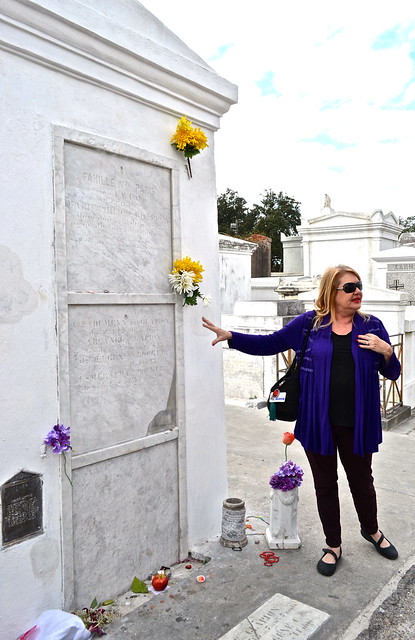
- There is a decades-old rumor that if people wanted Laveau to grant them a wish, they had to draw an “X” on the tomb, turn around three times, knock on the tomb, yell out their wish, and if it was granted, come back, circle their “X,” and leave Laveau an offering.
- The tomb in Saint Louis Cemetery No. 1 was vandalized on December 17, 2013, by being painted over with pink latex paint, likely in an attempt by a “homeless, mentally unstable kid” to cover up the “X” mark graffiti.
- Although some references to Marie Laveau in popular culture references to her as a “witch”, she is properly described as a ‘Voodoo priestess’.
The last stop on our trip was Armstrong Park. This is where we got to do our voodoo dolls.
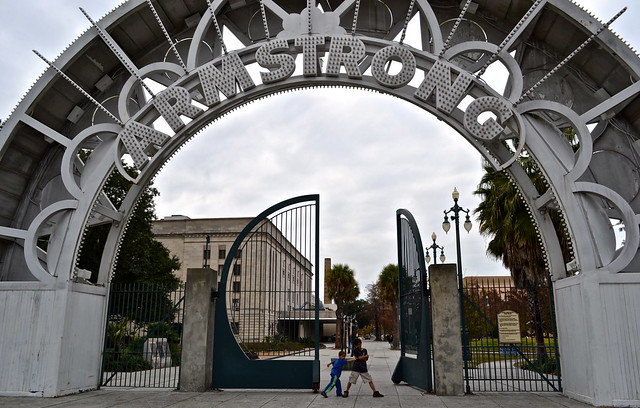
Here’s a quick fun fact about Armstrong Park. Congo Square which is found in the heart of the park was where the slaves back in the 19th century used to come to sing, dance, and drum in authentic African style. This became the roots of New Orleans’ unique music traditions and Jazz.
Recommended Read: City Park Christmas in the Oaks
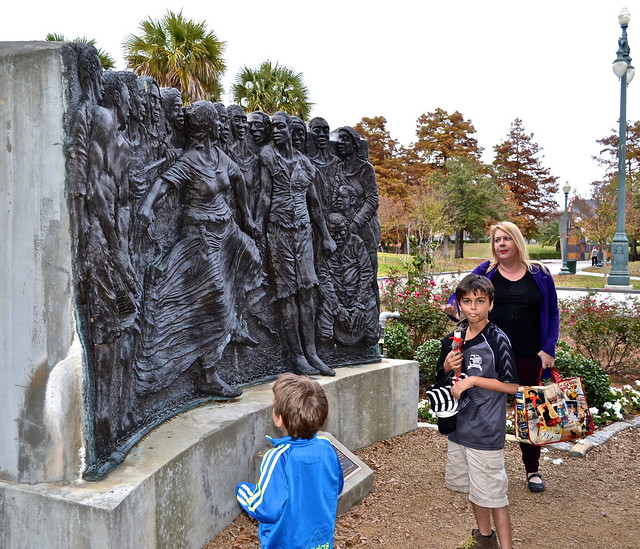
The fun starts here – well mainly for the kids. Even though my boys were amazing, the tour was a bit long for them. So making voodoo dolls was truly the reward.
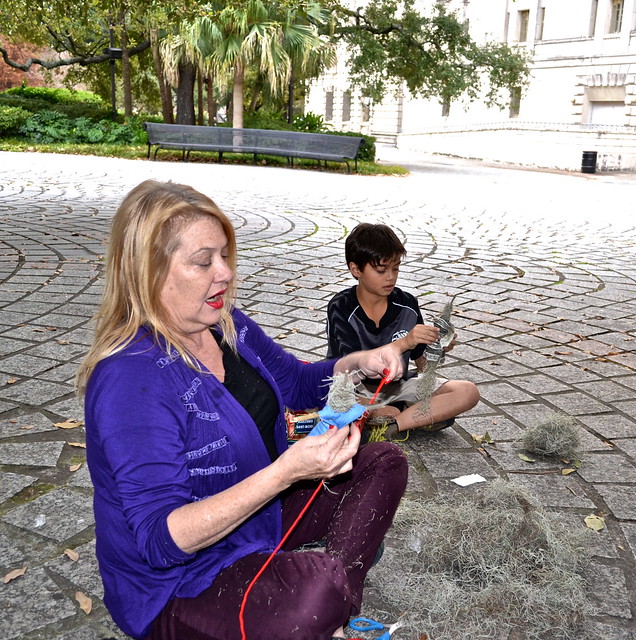
In the end, Mary blessed the dolls for us.
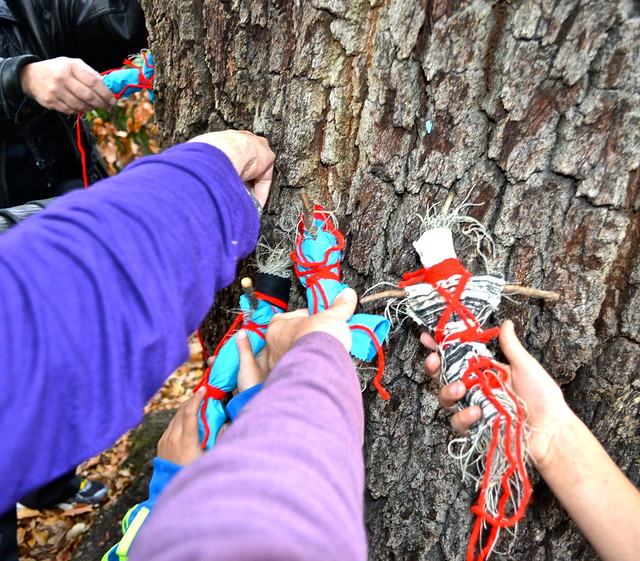
Video Fun
A brief history of Louisiana Voodoo:
Facts
- Louisiana Voodoo, also known as New Orleans Voodoo, describes a set of spiritual folkways which originated from the traditions of the African diaspora.
- It is a cultural form of the Afro-American religions developed by French, Spanish, and Creole population of the U.S. state of Louisiana.
- Voodoo became syncretized with the Catholic and Francophone culture of south Louisiana as a result of Creolization in the region resulting from the Atlantic slave trade.
- The Ouanga, a charm used to poison an enemy, contained the toxic roots of the figuier maudit tree, brought from Africa and preserved in the Caribbean.
- Another component of Louisiana Voodoo brought from West Africa was the veneration of ancestors and the subsequent emphasis on respect for elders.
- Someone who practices voodoo is often accused—especially by Hollywood—of being a powerful person who orders the spirits to do their bidding. That’s not the case at all. In fact, the opposite is true. Voodoo practitioners see themselves as servants of the spirits.
History
- Voodoo was brought to French Louisiana during the colonial period by workers and slaves from West Africa.
- Their knowledge of herbs, poisons, and the ritual creation of charms and amulets, intended to protect oneself or harm others, became key elements of Louisiana Voodoo.
- During the 19th century, Voodoo queens became central figures to Voodoo in the United States.
- They presided over many of the ceremonial meetings and ritual dances. They also earned an income by administering charms, amulets, and magical powders guaranteed to cure ailments, grant desires, and confound or destroy one’s enemies.
- Most noted for her achievements as the Voodoo queen of New Orleans in the 1830s was Marie Laveau, a mulatto woman. (More about her below)
- The influence of her Catholic strategy facilitated the adoption of Catholic practices into the Voodoo belief system.
- Doctor John, also known as Bayou John and Prince John, was one of the most prominent Voodoo kings in New Orleans.
- During the 1930s, true Voodoo went underground as New Orleans became an increasingly popular tourist destination.
- Voodoo both fascinated and repelled the white New Orleanians who came to watch the public rites that were held in Congo Square until 1857, where Armstrong Park is today.
- Voodoo acquired an exotic, Hollywood image in the 1932 film White Zombie.
- In the early 21st century, Voodoo has become a major tourist attraction in New Orleans. Commercial interests have sought to capitalize on popular interest in religion.
Tours and Information for Bloody Mary Tours
Phone: (504) 915-7774
Address: 941 Bourbon St, New Orleans 70116
Tours
NOTE: The tours that don’t have hours on them are only by appointment.
Tour of the Undead – Ghost, Voodoo & Vampire Trilogy Meets us in a haunted pub, visit historic sites, learn of sinners & saints, and see an 1800’s vampire lair while you Experience insight into New Orleans Spirit World, all in an incredible alternative historic presentation. This intense macabre marriage of real horrors, fear & folklore is swaddled in a blanket of Voodoo – A mixture of storytelling, narrative & ceremony topped with paranormal technique. Bring cameras for ghost photos. This tour has a little of everything!
8:00pm Friday, Saturday
Haunted Pub Tour- 21 & up! – Enjoy the New Orleans Original Scandal Tour in the Original Sin City with a paranormal twist! Begin with a toast to the ghost at our oldest haunted bar. Visit 3+ other bars in restaurants, hotels, & sometimes even a former brothel. See many haunted & historic hot spots in between. Bring your cameras for paranormal pictures of our sordid past & present. Corruption, conspiracy, scandals, Burlesque, prostitution & pirates, assassination plots, Mafia Kingfish, murder, and more. Plots and plans of Patriots & Pirates, Politicians & Presidents, Prostitutes, and the many pubs and locations they sealed their deals at. Connect with the Spirits of New Orleans in a Phantasmic Cocktail Walking Tour where History is first, ghosts 2nd & drinking is 3rd on the list!
4:30 pm Friday, Saturday & Sundays
New Orleans only evening Cemetery tour – A haunting experience. Gravestones and Ghosts await as we wander inside two cemeteries and see up to 10 more. See eclectic burial styles revealing the evolution of multicultural influences behind the building of these legendary cities of the dead. Learn Bloody Mary’s Spirit–taught holistic field method of Paranormal Investigation. Open your 3rd eye as we wander Cities of the Dead. This tour meets at Beachcorner bar 4905 Canal St. This is NOT walkable from French Quarter
5:00 PM Fri. & Sat.
The Voodoo Queen Marie Laveau Legacy
Take a trip through the lives of sinners and saints and see how they worked together to create America’s most mystical city. Get to the root of New Orleans’s most talked about the controversy: Voodoo and her most enigmatic leader, Voodoo Queen Marie Laveau. Walk inside New Orleans’s oldest Cities of the Dead, and possibly 1 bonus cemetery, sit under an ancient Oak tree in the sacred site of Congo Square- Drive through the history of the Treme and French quarter on the way. And see what’s become of Storyville- America’s first legal red light district, learn of some special Saints at the old Mortuary Chapel, and St Augustine Church Plus Get a Spiritual blessing at the tomb of The Voodoo Queen. A behind-the-scenes, insiders look into our special blend of Catholicism, Voodoo, and Hoodoo plus a detailed history of life and death in New Orleans. Hands on-You can make & keep your Own Voodoo Doll too!
12pm Friday & Sat
Ghost Town Tour-Haunted City & Cemetery
Tour the town with an unusual edge– see the city proper, plus the outskirts rarely visited by tourists-see the real New Orleans. Visit forgotten cemeteries, ancient oaks, Native American sacred sites, voodoo altars, the most famous haunted houses, and the more obscure in this behind-the-scenes tour. Visit 4 neighborhoods, cemeteries, City Park haunted Oaks plus psychic and paranormal connections on a Ghost hunt with a splash of voodoo, we go inside and out of many locations as we tour through the city to find them
Monday thru Friday 7:30 ( Tuesdays closed till March)
OR New Dusk to dark version 4 pm until 7 pm Sun & Mon Offered till daylight savings time starts!
Sinners & Saints Tour—3 churches, 2 graveyards & more!
Visit a Mortuary Chapel, a Minor Basilica, an old Archbishop’s church, and perhaps even a Baroque Cathedral. Greet our newest saints — Francis Seelos and Henriette Delille plus our 1st American saint— St. Frances Cabrini, all here in New Orleans! Learn about America’s only Spanish Inquisition scare. Freemasons, brothels, Storyville madams & politicians abound. Our night-time version visits outside Voodoo Queen Marie Laveau’s home and churches, but daytime goes inside churches and Cemeteries or can include a Garden District Witching Hour all customized. By appointment (day or night version available)
Magical Mystery Tour – A Haunted Picnic & Ritual
A behind-the-scenes glimpse into a Light-workers life, stirring old-school magic with a New Age offering- and So come learn cultural folk traditions, see our cities of the dead and visit City Park’s magical oaks & bayous. Learn how to make and use a voodoo doll! Walkabout sacred sites, cemeteries, voodoo altars, haunted sites and break bread with the undead, and open the Gates to the spirit of Place and a ceremonial Voodoo bayou blessing too!
Voodoo Doll Making Workshop
Hands-on crafting of a New Orleans Moss Voodoo Doll. Learn the proper use from Voodoo Queen Bloody Mary. There is also a lecture on the history, use, and misuse of this magical icon! Materials included. Can be scheduled privately or publicly as part of our voodoo/cem tour or as part of psychic readings
Voodoo Nights — A Ritual Tour
Hoodoo dat Voodoo? You do! Open your third eye and explore sacred sites, magical rites, psychic messages, and traiteur healings through the night—get a gris-gris bag, dab on some love potion #9, and get your own lucky mojo going!! Travel to historic New Orleans Voodoo Landmarks, do a River ritual, and/or schedule this all inside my private voodoo Houmfo.
Haunted Dinner Tour–A Romantic or Corporate Affair!
Bloody Mary awaits you to wine, dine, and raise a toast to the ghost! Sup at one of our many haunted restaurants to explore spirits and Creole cuisine or even go on a haunted picnic! Share ghost stories and photos and go on a haunting journey of old New Orleans. Can Include spiritual ceremony or psychic connections — A customized paranormal night out. Appointment
Paranormal & Psychic Reading Spiritual Adventure
Adventure in theory and practice! While away the hours privately in a haunted parlor or French Quarter courtyard connecting with spirits. Unlock the door to your psychic potential and explore with a seance, automatic writing, folk magic, past lives, spirit guides, spiritual beliefs & explore Haunted sites Appointment
The post Voodoo and Cemetery Tours in New Orleans appeared first on Travel Experta - Travel, Lifestyle, Freedom.
------------------------------------------
By: Marina 'Travel Experta'
Title: Voodoo and Cemetery Tours in New Orleans
Sourced From: travelexperta.com/voodoo-cemetery-tours-new-orleans/
Published Date: Fri, 03 Mar 2023 11:29:37 +0000






